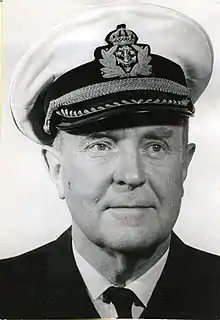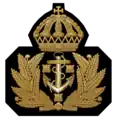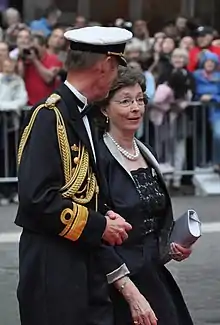Kommendör
Kommendör, abbreviated kmd (lit. 'Commodore', official Captain) is the senior-most commissioned officer rank below that of flag officer (i.e., admirals) in the Swedish Navy, ranking below rear admiral (lower half) and above commander. The rank is equivalent to colonel in the Swedish Army, Swedish Air Force and the Swedish Amphibious Corps.[3]
| Captain kommendör | |
|---|---|
 Flag of the captain, Swedish Navy. | |
 Shoulder mark of a Swedish captain. | |
 Sleeve insignia of a Swedish captain. | |
| Country | |
| Service branch | Swedish Navy |
| Abbreviation | Kmd (Swedish),[1] Capt (N) (English)[2] |
| Rank | Captain |
| NATO rank code | OF-05 |
| Non-NATO rank | O-6 |
| Formation | 1600s |
| Next higher rank | Rear admiral (lower half) (2000–) Senior captain (1972–2000) Rear admiral (–1972) |
| Next lower rank | Commander |
| Equivalent ranks | Colonel |
History
A captain used to serve as commander of ship of the lines.[4] The rank was introduced in 1674 as the title of the chief of staff of a squadron commander in the fleet.[5] In 1729, there were thirteen captains admitted to the Admiralty of Sweden (Amiralitetskollegiet). Captain in the navy was changed in 1771 to colonel.[6] During the 1824 regulation, the rank of colonel was changed to a new rank with the name commander of the 1st class (kommendörkapten av 1:a klassen), but in 1845 the rank of captain was reintroduced.[4]
During the first half of the 20th century, the captain served on board as squadron commander, division commander (coastal defence ship division) and as flag captain, ashore as station commander or shipyard commander, head of the Royal Swedish Naval Materiel Administration, department head there and in the Naval Staff, corps commander, etc. There were eight captains in the Swedish Navy in 1911.[4]
Previously, captain was a rank between rear admiral and commander of the 1st class (kommendörkapten av 1:a graden),[4] then between kommendör av 1. graden (senior captain) and commander (kommendörkapten), but today it is a rank between rear admiral (lower half) and commander.[1]
Promotion
Responsible head of promotion for a captain is the Director of Human Resources at the Swedish Armed Forces Headquarters.[7]
Uniform
Shoulder mark
The top galloon is shaped like a "loop" for an officer in the Swedish Navy (the loop is shaped like a "grenade" for an officer in the Swedish Amphibious Corps).[8] The rank insignia is worn on the shoulder mark to jacket and coat (jacka m/87, kappa m/87), as well as to blue wool sweater (blå ylletröja m/87), trench coat (trenchcoat m/84), sea coat (sjörock 93, black raincoat and to white shirt (vit skjorta m/78).[9] Rank insignia on shoulder mark (axelklaffshylsa 02B) is worn on all garments with shoulder straps.[10]
1. The shoulder mark (Axelklaffshylsa m/02B) is designed as galloons sewn directly to another shoulder mark (axelklaffshylsa m/87 blå).[10]
2. Before 2003, captains wore three 8 mm gold galloons and a loop of 16 mm gold galloons m/51.[11]
3. The wowen shoulder mark (AXELKLAFFSHYLSA M/02 INVÄVD KOMMENDÖR FLOTTAN) is worn on the naval combat dress (sjöstridsdräkt m/93), duty uniform (arbetsdräkt m/87 (blå)) and combat uniform (Fältuniform m/90 lätt, m/90 lätt blå, m/90 tropik (green, beige and blue)).[12]
 1. Embroidered shoulder mark (2003–present)
1. Embroidered shoulder mark (2003–present) 2. Embroidered shoulder mark (–2003)
2. Embroidered shoulder mark (–2003) 3. Wowen shoulder mark (2003–present)
3. Wowen shoulder mark (2003–present)
Sleeve insignia
Rank insignia is worn on both sleeves for inner suit jacket (innerkavaj m/48) and mess jacket (mässjacka m/1878).[9]
1. On the sleeve an 11 mm galloon m/51 with chevron and three 11 mm galloons m/51. Galloon 12.6 mm rank insignia (gradbeteckning m/02) (navy or amphibious corps). 12.6 mm galloon m/02 gradually replaces 11 mm galloon m/51. The distance between galloons should be 6 mm. The distance from the bottom edge of the sleeve to the bottom edge of the top galloon should be 100 mm.[13] This sleeve insignia was worn by a commander (kommendörkapten) until 2003.[11]
2. Before 2003, captains wore three 11 mm gold galloons and a loop of 23 mm gold galloon m/51.[11]
 1. Sleeve insignia for a captain (2003–present)
1. Sleeve insignia for a captain (2003–present) 2. Sleeve insignia for a captain (?–2003)
2. Sleeve insignia for a captain (?–2003)
Peaked cap
A captain wears as embellishments (known as scrambled egg) a gold embroidered laurel wreath (skärmbroderi m/49) on the visor of the peaked cap (skärmmössa m/48). It also fitted with a hat badge (mössmärke m/78 off för flottan) and with a strap in form of a golden braid (mössträns m/42).[14][15]
 Peaked cap worn by Captain Harry Bong.
Peaked cap worn by Captain Harry Bong. Hat badge
Hat badge
Side cap and winter hat
An officer wears a hat badge (mössmärke m/78 off) for the navy and another (mössmärke m/87 off) for amphibious units on the side cap (båtmössa m/48) and on the winter hat (vintermössa m/87).[16]
Aiguillette
A captain wears a large aiguillette (stor ägiljett m/1816) to mess dress, service dress uniform in connection with representation (equivalent), and to full dress uniforms. For uniform parts without a shoulder strap (axelklaff), a shoulder girdle is used in the navy (if applicable with a royal name cipher) to attach a large aiguillette to the shoulder next to the shoulder seam. For the inner jacket (innerkavaj m/48) and the mess jacket, the aiguillette is attached to two small buttons under the coat.[17]
 Large aiguillette (Stor ägiljett m/1816) on mess uniform
Large aiguillette (Stor ägiljett m/1816) on mess uniform
Personal flags
The command flag of a captain (and for a senior captain, colonel and senior colonel), is the so-called Örlogsstandert ("Navy Standard"), which is a triangular swallowtailed flag per fess blue and yellow.[19] The Navy Standard is carried on Swedish Navy ships, from which the captain exercises his command, or on which he travels in the service, but with the same restriction as for the admiral, etc.[20] The command flag received its current appearance in 1927.[21]
 Örlogsstandert
Örlogsstandert
Gun salute
When raising or lowering flags of the commander's, squadron, department or division commander, a gun salute is given with 11 rounds for captain (17 for admiral, 15 for vice admiral and 13 for rear admiral).[22]
References
Notes
- FFS 2019:6 2019, p. 3
- FM gemensamma identitet 2013, p. 66
- SFS 2000:556 2000, p. 2
- Westrin 1914, p. 637
- Tjänsteställningsutredningen 1967, p. 146
- "Kommendör". Förvaltningshistorisk ordbok (in Swedish). Svenska litteratursällskapet i Finland. Retrieved 14 October 2020.
- FFS 2018:7 2018, p. 10
- Laestadius 2015, p. 460
- Uniformsreglemente 2003, p. 137
- Laestadius 2015, pp. 460–461
- Uniformsreglemente 1999, p. 270
- Laestadius 2015, pp. 307–308, 325
- Laestadius 2015, p. 451
- Laestadius 2015, pp. 422–424
- Uniformsreglemente 2003, pp. 146–147
- Laestadius 2015, p. 424
- Laestadius 2015, p. 521
- Laestadius 2015, p. 582
- Braunstein 2004, p. 112
- Stenfelt 1920, p. 640
- Lybeck 1945, pp. 568–569
- Stenfelt 1920, p. 454
Print
- Braunstein, Christian (2004). Svenska försvarsmaktens fälttecken efter millennieskiftet [The flags and standards of the Swedish armed forces after the turn of the millennium] (PDF). Skrift / Statens försvarshistoriska museer, 1101-7023 ; 7 [dvs 8] (in Swedish). Stockholm: Statens försvarshistoriska museer. ISBN 91-971584-7-X. SELIBR 9815350. Archived from the original (PDF) on 2018-05-22. Retrieved 2020-10-15.
- Laestadius, Patrik, ed. (2015). Reglemente: uniformsbestämmelser 2015 : Unibest FM 2015 (PDF) (in Swedish). Stockholm: Swedish Armed Forces. SELIBR 19513428. Archived from the original (PDF) on 22 January 2019.
- Lybeck, Otto, ed. (1945). Svenska flottans historia: örlogsflottan i ord och bild från dess grundläggning under Gustav Vasa fram till våra dagar. Bd 3 [1815-1945] (PDF) (in Swedish). Malmö: Allhem. SELIBR 795890.
- Stenfelt, Gustaf (1920). Svenskt nautiskt lexikon: praktisk uppslagsbok för sjömän och maskinfolk, skeppsredare, konsulatpersonal, sjöassuradörer, skeppsmäklare, jurister m.fl (in Swedish). Stockholm: Wahlström & Widstrand. SELIBR 28204.
- Westrin, Theodor, ed. (1914). Nordisk familjebok: konversationslexikon och realencyklopedi (in Swedish). Vol. 14 (New, rev. and rich ill. ed.). Stockholm: Nordisk familjeboks förl. SELIBR 8072220.
- Uniformsreglemente för Försvarsmakten: UniR FM (in Swedish) (1999 ed.). Stockholm: Försvarsmakten. 1999. SELIBR 3051495.
- Uniformsreglemente för Försvarsmakten: UniR FM (PDF) (in Swedish) (2003 ed.). Stockholm: Försvarsmakten. 2003. SELIBR 9043529. Archived from the original (PDF) on 3 August 2020.
- Tjänsteställningsutredningen (1967). Tjänsteställning inom krigsmakten: betänkande (PDF). Statens offentliga utredningar, 0375-250X ; 1967:15 (in Swedish). Stockholm: Esselte. SELIBR 617608. Retrieved 2023-01-12.
Web
- "Förordning om ändring i officersförordningen (1994:882)" (PDF). Swedish Code of Statutes. 26 June 2000. Retrieved 7 October 2020.
- "Försvarsmaktens gemensamma identitet – direktiv för användandet av Försvarsmaktens namn, profil och bild" (PDF). 1.3 (in Swedish). Swedish Armed Forces. 2013-09-16. Archived from the original (PDF) on 1 September 2020. Retrieved 25 September 2020.
- "FFS 2018:7: Försvarsmaktens föreskrifter om befordran och konstituering" (in Swedish). FÖRSVARETS FÖRFATTNINGSSAMLING. 30 November 2018. Retrieved 21 October 2020 – via www.lagen.nu.
- "Försvarsmaktens föreskrifter om personaltjänst (FFS 2019:6)" (PDF) (in Swedish). Swedish Armed Forces. 2019-12-02. Retrieved 17 August 2020.